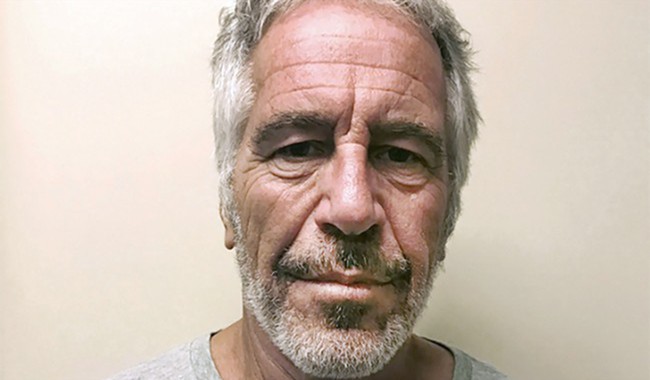
In the end, it turns out that radical transparency for a sex-trafficking ring doesn’t actually look all that controversial. Only one member of the House of Representatives voted against a bill forcing the release of all documentation in the Jeffrey Epstein investigations. The bill will now go to the Senate after passing on a 427-1 vote:
The House of Representatives on Tuesday overwhelmingly passed a bill ordering the release of the Justice Department’s files on late sex offender Jeffrey Epstein. It passed 427-1 — with GOP Rep. Clay Higgins as the only vote against the measure. https://abcnews.link/LbMqEL3
— ABC News (@ABC) Nov 17, 2025
After months of anticipation, the House of Representatives on Tuesday overwhelmingly passed a bill ordering the release of the Justice Department’s files on late sex offender Jeffrey Epstein.
It passed 427-1 — with GOP Rep. Clay Higgins as the only vote against the measure.
The bill will now head to the Senate, where its fate is uncertain.
Er … really? I’ll climb out on a limb here and bet that it passes the Senate in its current form. And it won’t be close, either. Democrats are still convinced that this scandal will only hurt Donald Trump, despite growing evidence to the contrary. Republicans don’t want to get in the way of an issue that this administration unwisely inflated into a political crisis in its opening weeks.
Besides, Trump made it clear this weekend that he wants the bill to pass so that all of the information will finally be public rather than fodder for demagoguery:
In fairness, of course, Trump had wanted the subject dropped altogether before House Democrats flipped a few GOP members to force the vote on the bill through the discharge petition. Trump then encouraged Republicans to support the bill, which could be seen as making the best of a bad position. In that scenario, Trump might have endorsed the bill in the hope that Senate Republicans would keep the bill off the floor.
However, Trump escalated his endorsement over the last couple of days, eschewing resigned acceptance and choosing enthusiastic embrace of the idea — both on Truth Social and in extemporaneous remarks with reporters. That makes it difficult for Senate Republicans to justify any holdout or obstruction of the bill, especially with Trump declaring his enthusiasm for signing the bill.
There are a couple of reservations, however, that may come up in the Senate. First off, much of this has already been released, if not all of it, albeit with redactions. That was why House Republican Clay Higgins held out and cast the only no vote, as he explained afterward:
The only lawmaker to vote against it, Rep. Clay Higgins of Louisiana, said he did so because of the way the legislation is written. “It abandons 250 years of criminal justice procedure in America. As written, this bill reveals and injures thousands of innocent people – witnesses, people who provided alibis, family members, etc,” he wrote on X after casting his vote.
True enough. Some innocent people will get dragged into this simply for having their names in the files. (Both Trump and Alan Dershowitz can speak to this at length.) At this point, though, anything less than full disclosure won’t do, politically or socially. The Senate will have to figure that out, and likely most of them already have. It’s time to rip this bandage off and deal with the inevitable fallout.
Second: This still won’t be the end of it. Again: most, if not all, of the information that this bill releases has already been released in one form or another. The grand jury transcripts, however, are under the control of the judiciary, not the Department of Justice. The bill can only compel the DoJ to release its files, not the federal judiciary:
(a) IN GENERAL.—Not later than 30 days after the date of enactment of this Act, the Attorney General shall, subject to subsection (b), make publicly available in a searchable and downloadable format all unclassified records, documents, communications, and investigative materials in the possession of the Department of Justice, including the Federal Bureau of Investigation and United States Attorneys’ Offices…
The bill never mentions information in the possession and/or control of the judiciary. It makes no mention at all of grand jury testimony. Even after the release of the material mandated by this bill, those transcripts will remain sealed and under the control of two federal judges. And they will be even more reluctant to release those for the same reasons articulated by Rep. Higgins, and with even more justification.
At least at that point, the fight will move from the political to the legal sphere. Trump and House Republicans will be happy to wash their hands of the politics around this scandal, and once Senate Republicans consider the issue, they will come to the same conclusion.
Editor’s note: If we thought our job in pushing back against the Academia/media/Democrat censorship complex was over with the election, think again. This is going to be a long fight.
Join our VIP Membership program! Choose VIP to support Hot Air and access our premium content, VIP Gold to extend your access to all Townhall Media platforms and participate in this show, or VIP Platinum to get access to even more content and discounts on merchandise. Use the promo code FIGHT to join or to upgrade your existing membership level today, and get 60% off!









